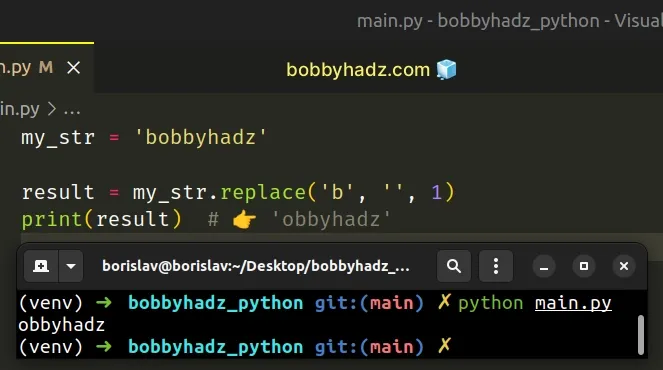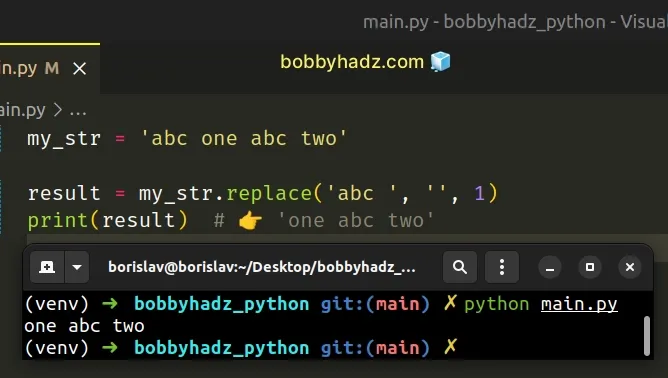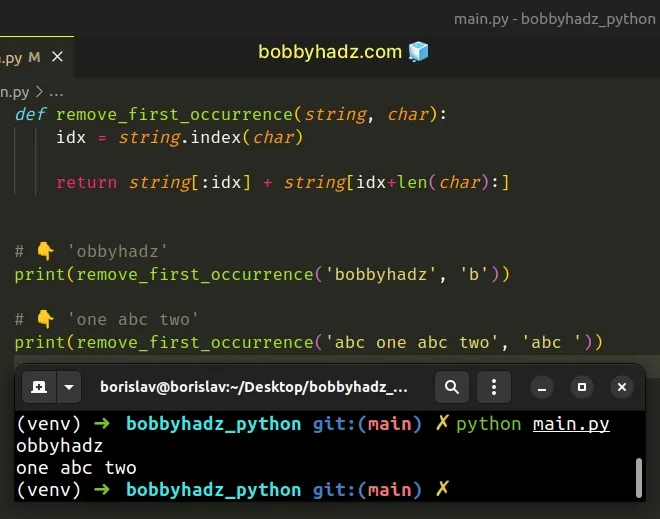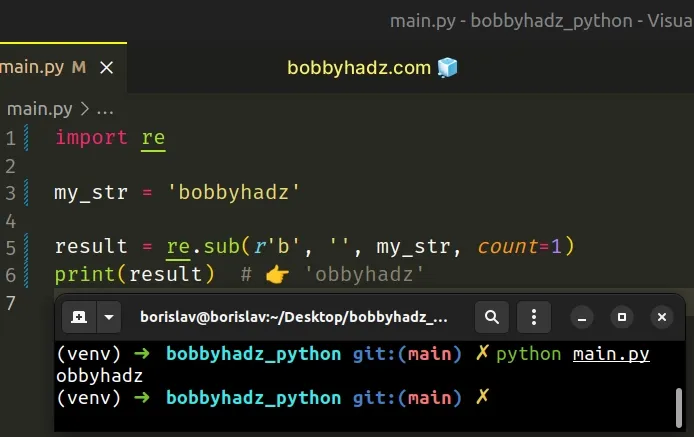Remove first occurrence of character from String in Python
Last updated: Apr 9, 2024
Reading time·3 min

# Table of Contents
- Remove first occurrence of character from String in Python
- Remove first occurrence of a Word from a String in Python
- Remove first occurrence of character from String using string slicing
- Remove first occurrence of character from String using re.sub()
# Remove first occurrence of character from String in Python
Use the str.replace() method to remove the first occurrence of a character
from a string.
The replace method will remove the first occurrence of the character from
the string by replacing it with an empty string.
my_str = 'bobbyhadz' result = my_str.replace('b', '', 1) print(result) # 👉️ 'obbyhadz'

We used the str.replace() method to remove the first occurrence of a character
from a string.
The str.replace() method returns a copy of the string with N occurrences of a substring replaced by the provided replacement.
The method takes the following parameters:
| Name | Description |
|---|---|
| old | The substring we want to replace in the string |
| new | The replacement for each occurrence of old |
| count | Only the first count occurrences are replaced (optional) |
The method doesn't change the original string. Strings are immutable in Python.
We want to remove the first occurrence of the character, so we used an empty string as the replacement.
my_str = 'bobbyhadz' result = my_str.replace('b', '', 1) print(result) # 👉️ 'obbyhadz'
1 for the count argument because we only want to remove the first occurrence of the character.# Remove first occurrence of a Word from a String in Python
You can use the same approach to remove the first occurrence of a word from a string.
my_str = 'abc one abc two' result = my_str.replace('abc ', '', 1) print(result) # 👉️ 'one abc two'

Alternatively, you can use string slicing.
# Remove first occurrence of character from String using string slicing
This is a four-step process:
- Get the index of the first occurrence of the character.
- Get a slice of the string up to the character.
- Get a slice of the string after the character.
- Concatenate the two strings.
def remove_first_occurrence(string, char): idx = string.index(char) return string[:idx] + string[idx+len(char):] # 👇️ 'obbyhadz' print(remove_first_occurrence('bobbyhadz', 'b')) # 👇️ 'one abc two' print(remove_first_occurrence('abc one abc two', 'abc '))

We defined a reusable function that takes a string and a character (or a word) and removes the first occurrence of the character (or word) from the string.
my_str[start:stop:step] where the start index is inclusive and the stop index is exclusive.The slice string[:idx] starts at the beginning of the string and goes up to,
but not including the character.
The slice string[idx+len(char):] starts at the index after the character and
goes to the end of the string.
The start index is inclusive, so we added the length of the substring to omit
it from the result.
This approach can also be used to remove the first occurrence of a word from a string.
# Remove first occurrence of character from String using re.sub()
You can also use the re.sub() method to remove the first occurrence of a
character in a string.
import re my_str = 'bobbyhadz' result = re.sub(r'b', '', my_str, count=1) print(result) # 👉️ 'obbyhadz'

The re.sub() method returns a new string that is obtained by replacing the occurrences of the pattern with the provided replacement.
import re a_str = 'bobby,hadz.com;' result = re.sub(r'[^\w\s]', '_', a_str) print(result) # 👉️ bobby_hadz_com_
If the pattern isn't found, the string is returned as is.
We didn't have to use a regular expression in the example, but you can specify
one as the first argument of re.sub() if your use case requires that.
# Additional Resources
You can learn more about the related topics by checking out the following tutorials:
- Remove all Non-Numeric characters from a String in Python
- Remove everything Before or After a Character in Python
- Remove First and Last Characters from a String in Python
- Remove the First N characters from String in Python
- Remove the last N characters from a String in Python
- Remove Newline characters from a List or a String in Python
- Remove non-alphanumeric characters from a Python string
- Remove non-ASCII characters from a string in Python
- Remove the non utf-8 characters from a String in Python
- Remove characters matching Regex from a String in Python
- Remove special characters except Space from String in Python

